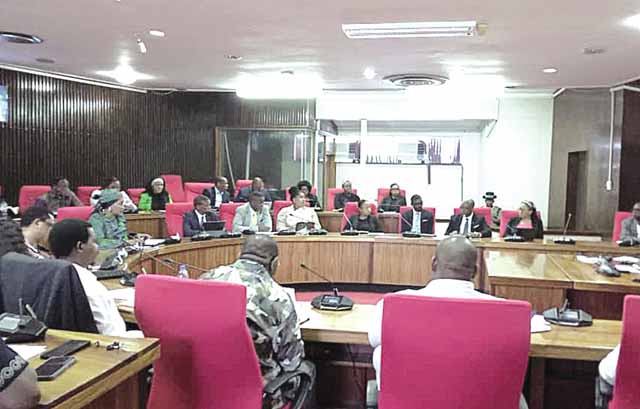By Source | 2021-01-14
Governments, international agencies and health systems have an obligation to ensure, to the best of their ability, adequate provision of health care for all.
However, this may not be possible during a pandemic, when health resources are likely to be limited. Setting priorities and rationing resources in this context means making tragic choices, but these tragic choices can be ethically justified. This is why we have ethics.
This policy brief answers a number of questions about the ethics of setting priorities for the allocation of resources during times of scarcity.
Such decisions may include access to hospitals, ventilators, vaccines and medicines. It is essential that policies and practices are ethically justified in such contexts.
The document provides a high-level ethical framework that can be used to guide decision-making, and complements WHO’s technical guidance.
Can I adapt previous frameworks for pandemic influenza to guide resource allocation for COVID-19?
Many ethical frameworks have been produced for resource allocation, some of which have been included in pandemic plans.
Those frameworks provide useful guidance in the current scenario.
Yet, when applying them, we must take into account the type of health care resource, the context, and the stage of the pandemic.
That is, while the ethical principles that apply to resource allocation might be the same in different pandemics, they can lead to different decisions, given contextual circumstances.
For example, this pandemic appears to significantly impact older adults (those 60 years of age or older), and such characteristics are relevant to shaping priorities for the allocation of resources during COVID-19.
As a result, it may be inappropriate to use critical care triage guidelines that have age cut-offs that deprioritise or exclude those aged over 60 years.
When applying ethical guidelines for resource allocation, we should consider the extent to which resources are overwhelmed in the current context.
It would be inappropriate, for instance, to exclude population groups from being allocated a resource (for example, ventilators) at the outset of a pandemic when capacity remains.
When resources are scarce, though – when there is an insufficient supply to meet everyone’s needs – resource allocation should be guided by well established, broadly applicable ethical principles, unless there are characteristics of the outbreak that justify different courses of action.
Irrelevant characteristics of populations within countries, such as ethnicity, race or creed, should play no role in any resource allocation in any pandemic. This reflects our commitment to treating people with equal respect.
How should decision-makers make considered ethical judgements about these matters, given the likelihood that there will not be enough of a resource? Who should be involved in decision-making on scarce resources?
For most decisions, multiple ethical values and principles will be relevant to deliberations about how to allocate resources.
This is likely to generate some disagreement, because different people may weigh the values differently. Some may prioritise equality while others might put more emphasis on best outcomes or prioritisation of the worst-off.
For this reason, it is imperative that the different values be weighed and applied to specific allocation issues using a fair process. A fair process for allocating scarce resources must promote certain ethical values:
Transparency. In a transparent process, the decisions and their justifications should be made public. This means that the population should be informed about the criteria guiding the decisions.
Inclusiveness. Those affected by allocation decisions including individuals, communities or countries – should be able to exert at least some influence over the decision-making process as well as the decision itself.
This also means that decisions four should be open to challenge and potentially revisable, perhaps through an appeal process.
Consistency. Decisions should be consistent so that all persons in the same categories are treated in the same way.
This means that favouritism towards one’s own family, religious or political compatriots, or otherwise, is not appropriate. All forms of corruption that are at variance with this principle should be challenged and condemned.
Accountability. Those making decisions about allocation must be accountable for those decisions – that is, they should justify their decisions and be held responsible for them.
A fair process means that allocation decisions should not be made by individuals, by individual pharmaceutical companies, or, in the case of allocation between countries, by a single country. Resources such as vaccines and therapies should not be stockpiled outside the system of fair allocation.
The fair allocation of resources is one that is valuable in itself precisely because it is fair.
However, it may also be valuable because a fair system engenders solidarity and trust, which are vital to the successful and sustained collective response necessary for dealing effectively with any outbreak.
What are the key ethical considerations that governments, vaccine manufacturers and funders should take into account to ensure a fair distribution of vaccines globally?
Countries are equally vulnerable to COVID-19 and have a shared responsibility, grounded in solidarity, to collaborate globally to mitigate the outbreak.
Each government has special obligations to its own citizens, but the fair allocation of vaccines globally requires us not to simply appeal to self-interest, claims of resource ownership and the prioritisation of compatriots.
Vaccines should be allocated in a way that prioritises those who fall into the categories presented in the below table.
(Where individuals or populations fall into multiple categories, they should receive even higher priority.)
What conclusions can we draw about the fair allocation of scarce resources within countries during the COVID-19 outbreak?
Health care workers (caring for patients) and first responders can justifiably be prioritised when allocating some resources because of their contribution to the health and well-being of the community.
Their health helps preserve the health of others. Participants of research aimed at developing vaccines, therapies or other critical resources should receive some priority in receiving those resources because they have also helped save others by their participation.
This is not an absolute priority for example, it should not take precedence over giving priority to those most at risk in the case of resources such as vaccines. While the principle of first come, first served is often applied when allocating resources in health care settings, it is rarely appropriate in an emergency. In practice, it is very likely to favour certain groups, such as those closest to a distribution centre, those with access to better information, or those who are most well-off.
Younger populations appear to be at lower risk in the COVID-19 context. Consequently, the principle of youngest first should have low priority for vaccine, but perhaps may have more weight if they do become sick and need critical care resources.
The allocation of different resources may find ethical justification in different principles or values. For instance, if a novel vaccine is found to be safe and effective, a lottery-based allocation may be justified among those as highest risk, the old and those with co-morbidities, if they outnumber available vaccines.
Maximising utility should be balanced with the principle of priority to the worst-off: centralising the availability of resources in larger centres may extend their benefits to more people, but may exclude isolated populations and challenge our concern for those at highest risk.
share story
Post Your Comments Below

SWAMA President and former member of parliament Lutfo Dlamini has been at the helm of Eswatini mu...

SOCCER - IN tatters!
All is not well at capital city giants Mbabane Highlanders' camp as a s...
Over 2 000 interned paramedics are said to be unemployed 10 years after completing their training...

CHIEFS in areas impacted by the Mkhondvo/Ngwavuma water augmentation programme phase 1B have aske...
All material © Swazi Observer. Material may not be published or reproduced in any form without prior written permission.
Design by Real Image Internet